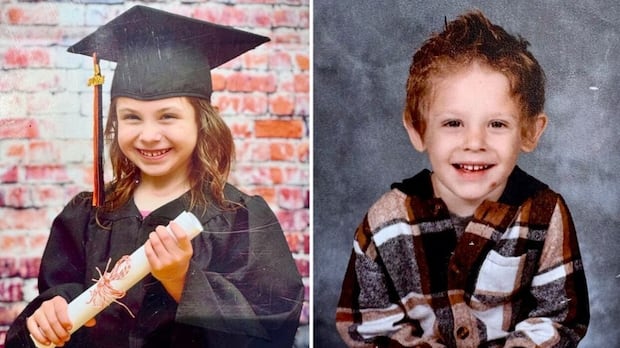'It's just really strange': Retired dog handler weighs in on search for missing N.S. children
Lilly Sullivan, 6, and Jack Sullivan, 4, were reported missing May 2
As search and rescue crews once again depart a rural Nova Scotia community without finding two children who disappeared more than two weeks ago, a retired RCMP dog handler says it is baffling the siblings are still missing after such wide-scale searches.
Lilly Sullivan, 6, and brother Jack Sullivan, 4, have been missing since May 2, when police received a 911 call reporting they had wandered away from their home in Lansdowne Station, a sparsely populated area about 140 kilometres northeast of Halifax.
The children's disappearance set off a massive operation that included upward of 160 ground search and rescue officials, dog teams, drones and helicopters.
But after six days of scouring the heavily wooded areas surrounding the siblings' home, covering 5.5 square kilometres, there was no sign of the children and RCMP announced the search was being scaled back.
Search and rescue crews were called back to Lansdowne Station on Saturday and Sunday for yet another search, focusing on specific areas around Gairloch Road. An RCMP spokesperson said officials would be reviewing the information collected and determining next steps.
Glenn Brown, who worked as an operational dog handler in the RCMP in several provinces for 26 years, said the fact the Sullivan children haven't been found is "just really strange."
"I find it hard to believe that a six- and four-year-old would just disappear like that," said Brown, who was involved in hundreds of searches during his career.
"I can guarantee you if I was still working today, it would be the thing to be racing around your mind all the time. Where would they have gone? We have done everything."
Robert Koester, a search mission co-ordinator with the Virginia Department of Emergency Management in the United States, said it's rare to never find the subject of a search — it only happens in about five per cent of cases.
That statistic is based on a database he compiled of a half-million search and rescue incidents from around the world.
Koester also created an app called Lost Person Behavior, which was used by searchers in Lansdowne Station.
He said there are a few possible reasons the subject or subjects might not be found during a search, including that the search area wasn't large enough or that a team was assigned to an area, but never made it there.
"The final reason is, it can just be darn hard to spot people out in the woods sometimes," said Koester, who wrote the book Lost Person Behavior: A Search and Rescue Guide on Where to Look — for Land, Air and Water.
"All it can take is a second or two of looking to your left when you needed to be looking to your right.... Especially with children, they can crawl into small, tight spaces that are obscured from view, so they can be very difficult to find."
While RCMP would not say what prompted them to return to the area over the weekend, Brown said it's not uncommon to bring searchers back in such investigations. In general, there are several factors that may prompt police to restart a missing persons search, he said.
If police had received a tip or evidence, the substance of that information likely was not known by the searchers or even officers on the ground, given that the RCMP's major crime unit is involved.
"They may tell them, 'We got a tip and we just want you to go in that area and search and see if you find anything,'" said Brown. "They don't even tell their own people that unless you are in the know, unless you're in that investigative group."
He added that it's possible evidence has been found during the course of the investigation, but RCMP are not releasing that information publicly.
As well, Brown said investigators may have reviewed information that warrants re-examining an area, or perhaps there were weather or wildlife concerns that prevented them from searching a particular area before.
Regardless of why they returned to Lansdowne Station on Saturday, Brown said he knows from experience that those search and rescue officials and police officers are carrying Lilly and Jack with them every step.
"They look at their own kids and look at their grandchildren and their nieces and nephews and they're probably wanting to go back in [and search]," he said. "It's such a heart-wrenching situation."
RCMP have said they have not ruled out the case is suspicious, and the major crime unit has been involved since the day after the disappearance.
The Mounties would not answer specific questions about the latest search and declined a request for an interview Tuesday.
With files from Nicola Seguin



